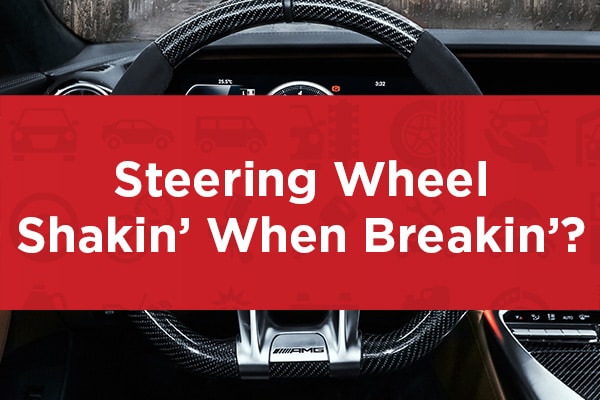5 Reasons Why Your Steering Wheel Shakes When Braking
If you’ve ever felt your steering wheel shakes when braking, it’s a jarring experience, to say the least. Addressing the issue as soon as you notice it is paramount in this situation.
In this article, we’ll uncover the five most common reasons why your steering wheel shakes when braking and how you can take action to protect your safety and your car’s health.
1. Excessive Lateral Runout in the Brake Rotors
Lateral runout in your rotors is a common reason your steering wheel shakes when braking. With time, your rotors can develop problems like distortion, meaning rotors aren’t perfectly flat.
This problem prevents your brake pads from pressing completely against your car’s rotor when braking, causing a pulsating vibration in your wheel when you stop.
Solutions and repairs for this problem include resurfacing or replacing your rotors. Have your car inspected regularly for routine maintenance to prevent lateral runout in the future.
2. Uneven Brake Pad Wear
Uneven brake pad wear is another potential reason your steering wheel shakes when braking. Your calipers press the brake pads against the rotors to help with braking, but a variation in disc thickness can develop when these calipers get stuck or seized. You might also experience uneven brake pad wear when there’s a lack of lubrication on the brake hardware.
You should also care for your brake fluid by exchanging it every two years or 24,000 miles. To alleviate high moisture content, which can cause corrosion inside the brake system.
3. Tire Issues
Issues with your tires are another leading cause of a steering wheel shaking when braking. Uneven tire wear, caused by problems like worn suspension parts or improper inflation, can cause your vehicle and your wheel to turn in a specific direction, meaning poor tire condition will impact your steering stability.
Other problems with your tires include imbalances and out-of-round tires, which cause your wheel to vibrate and shake back and forth when you brake. Tire maintenance, rotation, and alignment are important to prevent these issues.
4. Suspension Problems
Issues with your vehicle’s suspension system might be the culprit behind your wheel shaking. The suspension system supports your car’s weight and absorbs the impact of vibrations, bumps, and other on-road disturbances. However, if this system is damaged or components get worn out, your car might vibrate and shake when you apply the brakes, and your wheels might become misaligned.
Suspension problems include worn-out shock absorbers, struts, ball joints, bushings, and more. These issues can be mitigated by investing in regular system maintenance, such as inspections and component replacements.
5. Wheel Alignment
Improper wheel alignment can lead to steering issues like your steering wheel shaking when braking. Wheel alignment is a process that adjusts the suspension to ensure all wheels are parallel and standing up straight to roll smoothly on the road.
When your wheels aren’t properly aligned, your tires will wear unevenly. Maintaining proper tire alignment will prevent these issues, and is possible by using alignment equipment, which you’ll most often find from a professional car service.
Steering Wheel Shaking When Braking? Schedule Your Appointment Today
There are many reasons why your steering wheel shakes when braking, including excessive lateral runout, uneven brake pad wear, tire issues, suspension problems, and improper wheel alignment. Pay attention to possible symptoms and seek professional help to address the problem.
If you’re seeking a reliable auto repair shop in Augusta and Grovetown, Georgia, call us at [atc] AutoCenter today or schedule an appointment online to get started!
Like what you read? Find more information like this by checking out our educational car care articles to learn more.

